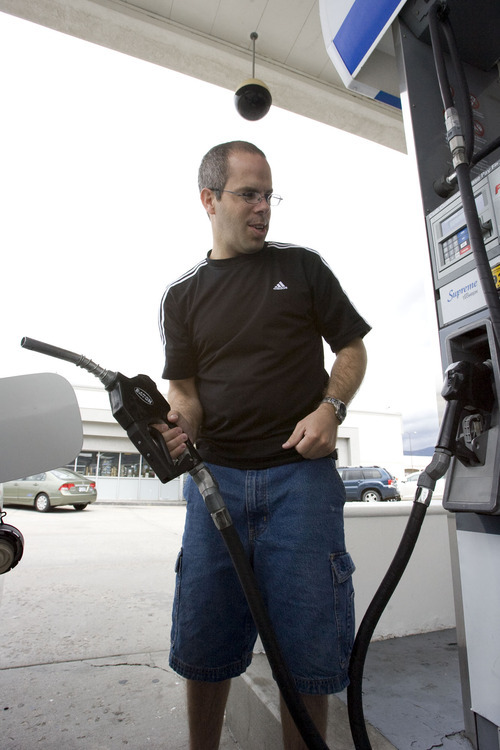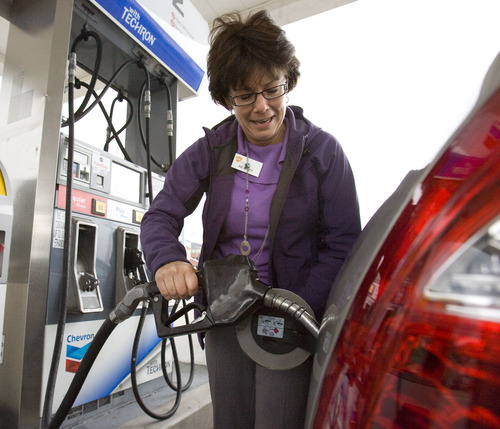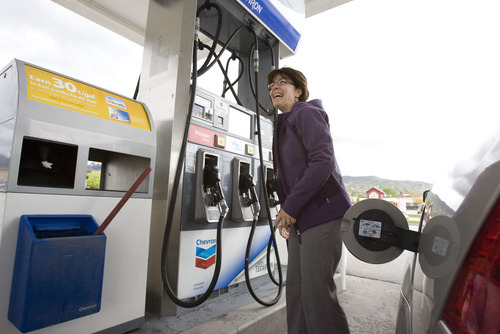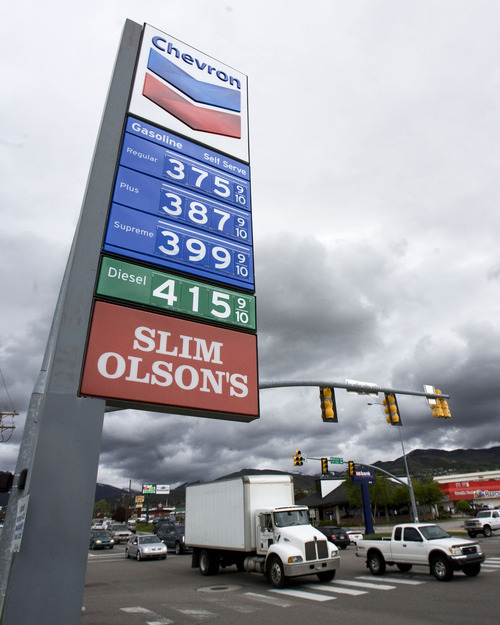This is an archived article that was published on sltrib.com in 2011, and information in the article may be outdated. It is provided only for personal research purposes and may not be reprinted.
With gasoline hovering near $4 a gallon, drivers have made tough choices such as scaling back vacations, driving less or ditching the car altogether. And a new Associated Press-GfK Poll indicates the impact of sustained high prices is spreading among seniors and higher-income Americans.
According to the poll, the share of all Americans who say increases in the price of gasoline will cause serious financial hardship for them or their families in the next six months now tops four in 10. Consumers interviewed Friday along the Wasatch Front echoed the pain.
Overall, the poll indicated 71 percent said rising prices will cause some hardship for them and their families, including 41 percent who called it a "serious" hardship. Just 29 percent said rising prices aren't causing a negative impact on finances.
Nathan Probert, of Bountiful, said he has been scrimping.
"I've cut way back on my driving, and I try to keep what I spend on gas below $20 a week. I've also tried to cut back in other areas — groceries and clothing. I do more work on the computer at home."
Although Sue Beckett, who was filling up her car in Woods Cross on Friday, said her family hasn't felt much financial impact , she's "worried about what is going to happen this summer if prices go up some more. Also, we have a son who is turning 16 in a few months, and we'll be making him pay for his own gas. So it will be interesting to see what is going to happen."
Although those with household incomes less than $50,000 were already feeling strained in March, the new poll suggests the financial pain is spreading to those with higher incomes. Among those making $50,000, 63 percent now say rising prices are causing them financial hardship, up from 55 percent in March.
For seniors, it's worse.
The share expressing financial hardship about gas prices hit 76 percent. It was 68 percent in March.
Darlene Coleman, of Midvale, who is living on a fixed retirement income, said high gasoline prices are a strain on her budget.
"You just have to watch where you go and what you do," she said. "Gas and groceries, they are the big worry right now."
Nettie Cash, 65, of Dallas, Ga., is cutting back on her medicine because of the cost of fueling her Buick. Cash is still taking her heart pills but is forgoing her inhaler and ulcer medicine for now.
"It's not easy," she said.
The public's coping strategies are largely unchanged from March, with 72 percent having cut back on other expenses, 66 percent saying they've reduced the amount of driving they do and 48 percent changing vacation plans.
Since January, gas prices have shot up about 90 cents, with the national average for a gallon of regular at $3.96 this week ($3.72 in Utah).
Financial analyst Nicole Polite in Baltimore sold her Nissan Altima recently and is taking public transportation, opting for the bus, rail and walking to get to work. Gas prices were just too high, she said, so she and her boyfriend downsized to a one-car household. They kept their Lexus sedan, which requires pricey premium gas.
"It's definitely a financial strain because now you have to reassess everything," said Polite, 32. "We don't go out as much. That $20 that we could have used to go to a movie — now that money has been absorbed by the gas tank."
But analysts say relief is coming. Fred Rozell, retail pricing director at the Oil Price Information Service, expects the price at the pump to drop as much as 40 cents during the next four weeks.
Until that happens, Ross Cobb, of Boerne, Texas, will try to keep his highway miles down. Cobb said he and his wife have been driving less and cutting down on trips into the city for their children's clothing and supplies.
"We coordinate all of our trips into San Antonio," said Cobb, an associate athletic director at the University of Texas at San Antonio. "We don't ever go in anymore just for one particular errand. We wait until we've got two or three things to do."
The Associated Press-GfK Poll was conducted May 5-9 by GfK Roper Public Affairs and Corporate Communications. It involved landline and cellphone interviews with 1,001 adults nationwide and has a margin of sampling error of plus or minus 4.2 percentage points.
Tribune reporter Steven Oberbeck contributed to this story. —
Driving tips for saving gas
1) Slow down • One of the best strategies is simply to reduce speed. As speed increases, fuel economy decreases exponentially.
2) Check tire pressure • Underinflated tires are among the most common causes of crummy mpg.
3) Check air filter • A dirty device restricts the flow of air into the engine, which reduces performance.
4) Accelerate with care • Jack-rabbit starts are an obvious fuel waster.
5) Keep speed constant • It takes much more fuel to get a vehicle moving than it does to keep it moving.
6) Get back to nature • Consider shutting off the air conditioner, which is a big fuel gulper.
7) Back off the bling • New wheels and tires may look cool, but if they're wider than stock tires, they'll create more rolling resistance and decrease fuel economy.
8) Clean out your car • It doesn't take much to acquire an extra 40 pounds of stuff, and the more weight your car has to lug around, the more fuel it burns.
9) Downsize • Smaller cars are inherently more fuel efficient. If you're shopping for a new car, it's time to re-evaluate how much car you need.
10) Don't drive • It's simple. If you can avoid driving, you'll save gas.
Source • Cars.About.com —
Where to findthe cheapestgasoline
O Prices among stations vary widely. A couple of websites can help:
aaa.com/gasprices • Real-time prices for more than 85,000 U.S. stations
gasbuddy.com • Data from motorists on specific prices in Utah and the Salt Lake City area —
Comparing gasoline prices
Utah
Friday average • $3.72
Week-ago average • $3.74
Month-ago average • $3.65
Year-ago average • $3.11
Nationwide
Friday average • $3.89
Week-ago average • $3.98
Month-ago average • $3.84
Year-ago average • 2.84









